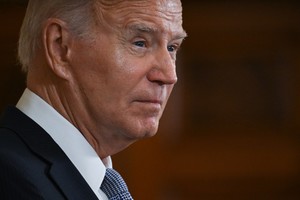When Democrats Decide to Elect Trump

The war in Gaza has consumed the entire planet, but nowhere outside the Middle East has the debate been waged as fiercely as within the Democratic Party. The ferocity with which young progressives have opposed the war, condemned Israel, and demanded a ceasefire has driven a wedge through the coalition that Joe Biden will need to gain re-election next year and created a growing obstacle to the party’s candidates up and down the ballot.
In the last several days, Democratic Party events at both ends of the country have been shut down by angry protestors. A brawl outside the party’s national headquarters resulted in the evacuation of members of Congress and injuries to several police officers and activists. Over the weekend, the California Democratic Party was forced to suspend their annual convention when over a thousand anti-war partisans overran the convention floor. In between, the Bay Bridge in San Francisco was closed by a massive march against the war during an international trade conference being held in that city at which Biden spoke, the latest in a series of large rallies that have taken place across the nation since the Hamas terrorist attack early last month.
Polls show that a majority of Americans support Israel’s military efforts, but that Democrats are deeply divided. The strongest voices of opposition come from young people, voters in minority communities, and other progressives. These voters represent the same Democratic base that never really warmed to Biden in 2020, opting for more liberal alternatives such as Bernie Sanders and Elizabeth Warren until it became clear that Biden was the party’s best hope for defeating Donald Trump. Over the last few years, they have grumbled that Biden has been insufficiently aggressive on immigration policy, climate change, criminal justice reform and other issues.
The result has been several polls showing an extremely close race, including a startling New York Times survey two weeks ago that showed Trump decisively defeating Biden in several key swing states. The reason for Biden’s low poll numbers has been less about him losing voters to Trump but rather growing signs of low turnout among left-leaning Democrats, primarily the same voters who are now most upset about his ongoing support for Israel. Biden’s increasingly public pressure on Israeli leaders to provide humanitarian support for Gaza civilians and even his threats to deny visas to West Bank settlers involved in violence against Palestinians have made little impression on these voters.
If anything, their anger is growing. And while the election is still slightly less than one year away, their cries of “we’ll remember in November” suggest that Biden’s efforts to win back these voters will be a steep uphill fight. His re-election campaign believes that the twin threats of Trump and abortion restrictions will ultimately inspire these progressive rebels to come back into the fold, but the protestors do not appear to be especially concerned that their efforts could return the GOP frontrunner to the White House.
In the weeks ahead, Biden will be negotiating with Republican congressional leaders over U.S.-Mexico border security and other immigration-related issues. Which means the unhappiness on the party’s left will continue to grow. At some point, a leader respected by progressive voters will need to remind them that their resentments toward Biden could lead to another Trump presidency. But it’s difficult to see who might possess both the willingness to deliver that message and the credibility for it to be received. Bernie Sanders? Barack or Michelle Obama? Alexandria Ocasio-Cortez? No immediate solution springs to mind, perhaps because that magic savior does not exist.
The last president to face this type of challenge was Lyndon Johnson, at the height of another controversial war that was especially unpopular among young people and other liberal voters. Johnson ultimately chose not to run for re-election, and his successor was defeated by Richard Nixon after a third-party candidate attracted significant Democratic support.
Barring a significant health crisis, it’s almost impossible to imagine Biden making the same decision as Johnson to step aside. But the unrest that erupted at Democratic gatherings last week will continue to grow. And it’s worth noting that the party will be returning this summer to the city of Chicago for its nominating convention, the same place where they gathered in 1968 to kick off their ill-fated campaign that year, when young activists turned against an unpopular president and turned the White House over to the opposition party for the next eight years.
Want to talk about this topic more? Join Dan for his webinar "Politics In The Time of Coronavirus." Or read more of Dan’s writing at: www.danschnurpolitics.com.
Dan Schnur is a Professor at the University of California – Berkeley, Pepperdine University, and the University of Southern California, where he teaches courses in politics, communications and leadership. Dan is a No Party Preference voter, but previously worked on four presidential and three gubernatorial campaigns, serving as the national Director of Communications for the 2000 presidential campaign of U.S. Senator John McCain and the chief media spokesman for California Governor Pete Wilson. He has a Center bias.
This piece was reviewed and edited by Isaiah Anthony, Deputy Blog Editor (Center bias).
Image Source: Ali Harb / Al Jazeera

May 9th, 2024

May 7th, 2024

May 7th, 2024